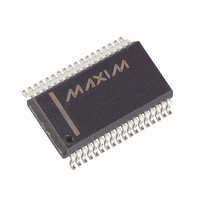MAX6955AAX+T Maxim Integrated Products, MAX6955AAX+T Datasheet - Page 19

MAX6955AAX+T
Manufacturer Part Number
MAX6955AAX+T
Description
IC DRVR DSPL LED 36-SSOP
Manufacturer
Maxim Integrated Products
Datasheet
1.MAX6955AAX.pdf
(43 pages)
Specifications of MAX6955AAX+T
Display Type
LED
Configuration
7, 14, 16 Segment
Interface
I²C
Current - Supply
22mA
Voltage - Supply
2.7 V ~ 5.5 V
Operating Temperature
-40°C ~ 125°C
Mounting Type
Surface Mount
Package / Case
36-SSOP
Number Of Digits
16
Number Of Segments
128
Low Level Output Current
935 mA
High Level Output Current
55 mA
Operating Supply Voltage
2.7 V to 5.5 V
Maximum Supply Current
30 mA
Maximum Power Dissipation
941 mW
Maximum Operating Temperature
+ 125 C
Mounting Style
SMD/SMT
Minimum Operating Temperature
- 40 C
Lead Free Status / RoHS Status
Lead free / RoHS Compliant
Digits Or Characters
-
Lead Free Status / Rohs Status
Details
The Key_A debounced, Key_B debounced, Key_C
debounced, and Key_D debounced read-only registers
(Table 35) show which keys have been detected as
debounced by the key-scanning circuit.
Each bit in the register corresponds to one key switch.
The bit is set if the switch has been correctly
debounced since the register was read last. Reading a
debounced register clears that register (after the data
has been read) so that future keys pressed can be
identified. If the debounced registers are not read, the
key-scan data accumulates. However, as there is no
FIFO in the MAX6955, the user is not able to determine
key order, or whether a key has been pressed more
than once, unless the debounced key status registers
are read after each interrupt, and before the next key-
scan cycle.
Reading any of the four debounced registers clears the
P4/IRQ output. If a key is pressed and held down, the
key is reported as debounced (and IRQ issued) only
once. The key must be detected as released by the key-
scanning circuit, before it debounces again. If the
debounced registers are being read in response to the
P4/IRQ being asserted, then the user should generally
read all four registers to ensure that all the keys that were
detected by the key-scanning circuit are discovered.
The Key_A pressed, Key_B pressed, Key_C pressed,
and Key_D pressed read-only registers (Table 36)
show which keys have been detected as pressed by
the key-scanning circuit during the last test.
Each bit in the register corresponds to one key switch.
The bit is set if the switch has been detected as
pressed by the key-scanning circuit during the last test.
The bit is cleared if the switch has not been detected
as pressed by the key-scanning circuit during the last
test. Reading a pressed register does not clear that
register or clear the P4/IRQ output.
The display test register (Table 37) operates in two
modes: normal and display test. Display test mode
turns all LEDs on (including DPs) by overriding, but not
altering, all controls and digit registers (including the
shutdown register), except for the digit-type register
and the GPIO configuration register. The duty cycle,
while in display test mode, is 7/16 (see the Choosing
Supply Voltage to Minimize Power Dissipation section).
2-Wire Interfaced, 2.7V to 5.5V LED Display
______________________________________________________________________________________
Driver with I/O Expander and Key Scan
Key Debounced Registers
Display Test Register
Key Pressed Registers
The RC oscillator uses an external resistor, R
an external capacitor, C
The allowed range of f
sets the peak segment current. The recommended val-
ues of R
makes the blink frequencies selectable between 0.5Hz
and 1Hz. The recommended value of R
peak current to 40mA, which makes the segment cur-
rent adjustable from 2.5mA to 37.5mA in 2.5mA steps.
where:
K
K
R
C
C
The recommended value of R
ommended value of C
The recommended value of R
allowed value, since it sets the display driver to the
maximum allowed peak segment current. R
set to a higher value to set the segment current to a
lower peak value where desired. The user must also
ensure that the peak current specifications of the LEDs
connected to the driver are not exceeded.
The effective value of C
external capacitor used, but also the stray capacitance
from OSC to GND. This capacitance is usually in the
1pF to 30pF range, depending on the layout used.
Bicolor digits group a red and a green die together for
each display element, so that the element can be lit red
or green (or orange), depending on which die (or both)
is lit. The MAX6955 allows each segment’s current to
be set individually from the 1/16th (minimum current
and LED intensity) to 15/16th (maximum current and
LED intensity), as well as off (zero current). Thus, a
bicolor (red-green) segment pair can be set to 256
color/intensity combinations.
L
F
SET
SET
STRAY
Selecting External Components R
= 2240
= 10K (typ)
= external resistor in kΩ
= external capacitor in pF
C
= stray capacitance from OSC pin to GND in pF
SET
SET
and C
f
OSC
to Set Oscillator Frequency and
Applications Information
I
= K
SET
SEG
F
SET
OSC
set the oscillator to 4MHz, which
/(R
= K
SET
SET
SET
is 22pF.
Peak Segment Current
L
is 1MHz to 8MHz. R
, to set the frequency, f
/R
includes not only the actual
Driving Bicolor LEDs
x C
SET
SET
SET
SET
mA
is 56kΩ and the rec-
) MHz
is the minimum
SET
also sets the
SET
SET
SET
SET
can be
, and
and
OSC
also
19
.











